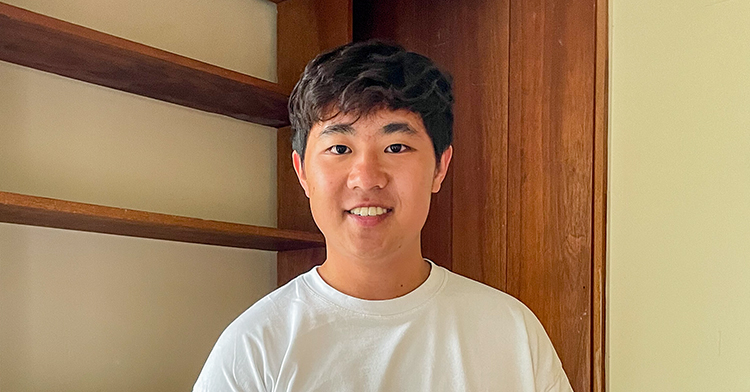Merging mathematics expertise with public health

Nathan Szeto, MS ’25
Biostatistics
Nathan Szeto, MS ’25, knows the power of numbers.
As a Master of Science student in Biostatistics at the University of Michigan School of Public Health, he’s found a way to combine his love for mathematics with his desire to help others.
His journey from a small town in Washington to Ann Arbor was not without obstacles, but his persistence and curiosity led him to a field where he can make a significant impact.
Szeto grew up in Yakima, Washington, a mid-sized town in the center of the state that provided both challenges and motivation. Yakima, economically disadvantaged by some measures, lacks resources in education, Szeto said. He had hardworking teachers who were dedicated to their students and helped him overcome limited access to educational resources to excel academically.
READ MORE about faculty, students, alumni and staff.
Through an internship with Dr. Song, I gained a deeper understanding of both biostatistics and public health. This experience motivated me to pursue public health further and ultimately led me to my current studies.”
After high school, he attended Williams College in Massachusetts, a top-ranked liberal arts college, where he was drawn to the school’s strong commitment to teaching and majored in Mathematics.
“At the time, I was unsure about my future career path, so I chose mathematics for its versatility,” Szeto said. “I also appreciated the professors in the department.
“I had always been a good student, but high school was when I began really focusing on academics. Choosing Williams allowed me to experience a new part of the country and receive a well-rounded education, which I valued greatly.”
His interest in biostatistics developed gradually. Initially, he didn’t enter the field for its public health applications. Instead, he saw biostatistics as a way to apply his mathematical skills in meaningful ways that could improve lives.
While researching graduate programs, he discovered biostatistics and its potential impact on public health. This led him to Michigan Public Health, where he found the Department of Biostatistics committed to cutting-edge research and inspiring mentors.
During an internship, Szeto worked closely with Peter Song, professor of Biostatistics, further immersing himself in the realm. This experience helped solidify his decision to focus on public health research. He was drawn by the field’s capacity to make a tangible impact, a quality that set it apart from other areas of study.
“Through an internship with Dr. Song, I gained a deeper understanding of both biostatistics and public health,” Szeto said. “This experience motivated me to pursue public health further and ultimately led me to my current studies.”
Szeto found the Biostatistics department to be a place full of encouragement and ideas. He appreciated the chance to work on real-world projects alongside professors and fellow graduate students.
Public health offers a direct view of how its efforts benefit communities, Szeto said. For instance, the development of COVID vaccines clearly demonstrated immediate improvements in public well-being.
One significant project Szeto worked on involved using wastewater-based epidemiology to track the spread of COVID-19 spread.
“I've been involved in a significant research project where our team used wastewater-based epidemiology to track COVID’s spread by analyzing viral RNA in sewage,” he said. “This method provided reliable metrics, addressing gaps in traditional tracking and predicting community infection levels. It's an effective tool not only for COVID but for monitoring other diseases.”
Szeto values public health for its visible impact on community well-being, which was particularly evident during the pandemic.
“I find the immense impact of public health especially fascinating,” he said. “It’s often overlooked until it’s urgently needed, like during the COVID-19 pandemic, which suddenly brought agencies like the NIH and CDC into the spotlight. Public health is crucial in improving and safeguarding lives, yet it doesn't receive enough recognition. One of the most rewarding aspects of this field is the tangible difference we make.”
While pursuing his master’s degree at Michigan Public Health, Szeto has been supported by mentors such as Song and Mousumi Banerjee, the Anant M. Kshirsagar Collegiate Research Professor of Biostatistics. He credits them with inspiring his enthusiasm and dedication to the field, noting their encouragement as a motivational force behind his ongoing studies.
Their openness and approach to teaching have left a lasting impression, embodying the supportive community he values so much in his education.
PROSPECTIVE STUDENT? Learn more about Michigan Public Health.
I've been involved in a significant research project where our team used wastewater-based epidemiology to track COVID’s spread by analyzing viral RNA in sewage. This method provided reliable metrics, addressing gaps in traditional tracking and predicting community infection levels. It's an effective tool not only for COVID but for monitoring other diseases.”
“I deeply appreciated Dr. Song’s mentorship and explored work on research databases and developing an R package for another project,” Szeto said. “Upon acceptance here, he offered a temporary hourly research role, which became invaluable in my studies.
“Professors like Dr. Banerjee exemplify dedication, managing understanding and empathy in instruction, celebrating successes uniquely—with her, student success is truly appreciated.
“Realizing the privilege of having such work opportunities is motivating, especially knowing how hard research positions are to come by in large programs. Attending lab meetings and witnessing PhD students’ advanced dissertation work has motivated me to consider furthering my studies. Working with professors here may seem daunting at first but ultimately, it’s encouraging because they push you towards opportunities.
Szeto plans to pursue a PhD, focusing on machine learning interpretability. His goal is to develop methods to enhance the interpretability of AI models while maintaining their performance—important in ensuring that public health, data-driven decisions are both reliable and understandable.
While he hasn’t settled on a specific realm within public health to focus his research, Szeto is confident that his work will continue to make a significant impact on the field, staying true to his original aim of improving people's lives through his skills in biostatistics.
SUPPORT research and engaged learning at Michigan Public Health.
